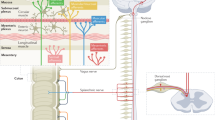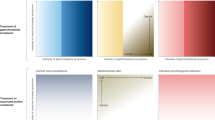Abstract
The pathophysiology of irritable bowel syndrome (IBS) is heterogeneous; it is possible for several mechanisms to be disturbed in the same patient. Isolating a single target for pharmacological manipulation is also difficult because of the complexity and overlap of the neural circuitry in the enteric and central nervous system. This review summarizes the rationale and efficacy of current and future therapies for IBS, on the basis of putative pathophysiological models. The modulation of gastrointestinal sensorimotor function, intestinal gas handling, the gastrocolonic reflex, neurohormonal stress responses, central processing of afferent information, and microbial flora are the current frontiers for experimental therapeutics for IBS. Patients presumed to have POSTINFECTIOUS IBS have also been targeted as a distinct group. In the very near future, it is unlikely that a single drug will come to the fore as a suitable and successful treatment for everyone with IBS, but new data on potential therapeutic targets lend hope for the improved long-term management of IBS. Disease modification rather than just symptom-based treatments must remain the goal.
This is a preview of subscription content, access via your institution
Access options
Subscribe to this journal
Receive 12 print issues and online access
$209.00 per year
only $17.42 per issue
Buy this article
- Purchase on Springer Link
- Instant access to full article PDF
Prices may be subject to local taxes which are calculated during checkout

Similar content being viewed by others
References
Drossman DA et al. (2002) AGA technical review on irritable bowel syndrome. Gastroenterology 123: 2108–2131
Talley NJ (2003) Evaluation of drug treatment in irritable bowel syndrome. Br J Clin Pharmacol 56: 362–369
Kellow JE and Phillips SF (1987) Altered small bowel motility in irritable bowel syndrome is correlated with symptoms. Gastroenterology 92: 1885–1893
Locke GR III et al. (2004) The relationship between transit parameters and GI symptom complexes. Gastroenterology 126: A438
Bazzocchi G et al. (1990) Postprandial colonic transit and motor activity in chronic constipation. Gastroenterology 98: 686–693
Vassallo M et al. (1992) Transit through the proximal colon influences stool weight in the irritable bowel syndrome. Gastroenterology 102: 102–108
Stivland T et al. (1991) Scintigraphic measurement of regional gut transit in idiopathic constipation. Gastroenterology 101: 107–115
Gershon MD (1999) Review article: roles played by 5-hydroxytryptamine in the physiology of the bowel. Aliment Pharmacol Ther 13 (Suppl 2): 15–30
Cremonini F et al. (2003) Efficacy of alosetron in irritable bowel syndrome: a meta-analysis of randomized controlled trials. Neurogastroenterol Motil 15: 79–86
Thumshirn M et al. (2000) Effects of alosetron on gastrointestinal transit time and rectal sensation in patients with irritable bowel syndrome. Aliment Pharmacol Ther 14: 869–878
Mayer EA et al. (2002) The effect of the 5-HT3 receptor antagonist, alosetron, on brain responses to visceral stimulation in irritable bowel syndrome patients. Aliment Pharmacol Ther 16: 1357–1366
Camilleri M et al. (2002) Serotonin-transporter polymorphism pharmacogenetics in diarrhea- predominant irritable bowel syndrome. Gastroenterology 123: 425–432
Caras S (2001) Cilansetron shows efficacy in male and female non-constipated patients with irritable bowel syndrome in a United States study. Gastroenterology 120: A217
Prather CM et al. (2000) Tegaserod accelerates orocecal transit in patients with constipation-predominant irritable bowel syndrome. Gastroenterology 118: 463–468
Coffin B et al. (2003) Tegaserod, a 5-HT4 receptor partial agonist, decreases sensitivity to rectal distension in healthy subjects. Aliment Pharmacol Ther 17: 577–585
Evans BW et al. (2004) Tegaserod for the treatment of irritable bowel syndrome. Cochrane Database Syst Rev 1: CD003960
Krevsky B et al. (1989) Cisapride accelerates colonic transit in constipated patients with colonic inertia. Am J Gastroenterol 84: 882–887
Farup PG et al. (1998) The symptomatic effect of cisapride in patients with irritable bowel syndrome and constipation. Scand J Gastroenterol 33: 128–131
Camilleri M et al. (2004) Effect of renzapride on transit in constipation-predominant irritable bowel syndrome. Clin Gastroenterol Hepatol 2: 895–904
Emmanuel AV et al. (2002) Prucalopride, a systemic enterokinetic, for the treatment of constipation. Aliment Pharmacol Ther 16: 1347–1356
Hawkes ND et al. (2002) Naloxone treatment for irritable bowel syndrome—a randomized controlled trial with an oral formulation. Aliment Pharmacol Ther 16: 1649–1654
Manara L et al. (2002) Functional assessment of neuronal cannabinoid receptors in the muscular layers of human ileum and colon. Dig Liver Dis 34: 262–269
Karst M et al. (2003) Analgesic effect of the synthetic cannabinoid CT-3 on chronic neuropathic pain: a randomized controlled trial. JAMA 290: 1757–1762
Coulie B et al. (2000) Recombinant human neurotrophic factors accelerate colonic transit and relieve constipation in humans. Gastroenterology 119: 41–50
Parkman HP et al. (2003) Neurotrophin-3 improves functional constipation. Am J Gastroenterol 98: 1338–1347
Serra J et al. (2002) Lipid-induced intestinal gas retention in irritable bowel syndrome. Gastroenterology 123: 700–706
Caldarella MP et al. (2002) Prokinetic effects in patients with intestinal gas retention. Gastroenterology 122: 1748–1755
Lin HC (2004) Small intestinal bacterial overgrowth. A framework for understanding irritable bowel syndrome. JAMA 292: 852–858
Pimentel M et al. (2003) Normalization of lactulose breath testing correlates with symptom improvement in irritable bowel syndrome. A double-blind, randomized, placebo-controlled study. Am J Gastroenterol 98: 412–419
Bjornsson ES et al. (1998) Differential 5-HT3 mediation of human gastrocolonic response and colonic peristaltic reflex. Am J Physiol 275: G498–G505
D'Amato M et al. (2001) The CCK-1 receptor antagonist dexloxiglumide is effective and safe in female patients with constipation predominant irritable bowel syndrome. Am J Gastroenterol 96 (Suppl): S317
Cremonini F et al. The CCK-A antagonist dexloxiglumide accelerates gastric emptying and delays proximal colonic transit in female patients with irritable bowel syndrome. Am J Gastroenterol, in press.
Mertz H et al. (1995) Altered rectal perception is a biological marker of patients with irritable bowel syndrome. Gastroenterology 109: 40–52
Bouin M et al. (2002) Rectal distention testing in patients with irritable bowel syndrome: sensitivity, specificity, and predictive values of pain sensory thresholds. Gastroenterology 122: 1771–1777
Jailwala J et al. (2000) Pharmacologic treatment of the irritable bowel syndrome: a systematic review of randomized, controlled trials. Ann Intern Med 133: 136–147
Delgado-Aros S et al. (2003) Effects of a kappa-opioid agonist, asimadoline, on satiation and GI motor and sensory functions in humans. Am J Physiol Gastrointest Liver Physiol 284: G558–G566
Delvaux M et al. (2004) Effect of asimadoline, a kappa opioid agonist, on pain induced by colonic distension in patients with irritable bowel syndrome. Aliment Pharmacol Ther 20: 237–246
Lee OY et al. (2000) A double blind parallel group pilot study of the effects of CJ-11,974 and placebo on perception and emotional responses to rectosigmoid distensions in IBS patients. Gastroenterology 118: A846
Fioramonti J et al. (2003) Intestinal anti-nociceptive behaviour of NK3 receptor antagonism in conscious rats: evidence to support a peripheral mechanism of action. Neurogastroenterol Motil 15: 363–369
Kim HJ et al. (2004) Association of distinct alpha(2) adrenoceptor and serotonin transporter polymorphisms with constipation and somatic symptoms in functional gastrointestinal disorders. Gut 53: 829–837
Bharucha AE et al. (1997) Adrenergic modulation of human colonic motor and sensory function. Am J Physiol 273: G997–G1006
Viramontes BE et al. (2001) Effects of an alpha(2)-adrenergic agonist on gastrointestinal transit, colonic motility, and sensation in humans. Am J Physiol Gastrointest Liver Physiol 281: G1468–G1476
Camilleri M et al. (2003) A randomized, controlled exploratory study of clonidine in diarrhea-predominant irritable bowel syndrome. Clin Gastroenterol Hepatol 1: 111–121
Prior A et al. (1988) Double-blind study of an alpha 2 agonist in the treatment of irritable bowel syndrome. Aliment Pharmacol Ther 2: 535–539
Kim HJ et al. (2003) A randomized controlled trial of a probiotic, VSL#3, on gut transit and symptoms in diarrhoea-predominant irritable bowel syndrome. Aliment Pharmacol Ther 17: 895–904
Spiller RC (2003) Postinfectious irritable bowel syndrome. Gastroenterology 124: 1662–1671
Mayer EA and Collins SM (2002) Evolving pathophysiologic models of functional gastrointestinal disorders. Gastroenterology 122: 2032–2048
Barbara G et al. (2002) A role for inflammation in irritable bowel syndrome? Gut 51 (Suppl 1): 41–44
Dunlop SP et al. (2003) Randomized, double-blind, placebo-controlled trial of prednisolone in post-infectious irritable bowel syndrome. Aliment Pharmacol Ther 18: 77–84
Talley NJ et al. (2004) Antidepressants in IBS: are we deluding ourselves? Am J Gastroenterol 99: 921–923
Creed F et al. (2003) The cost-effectiveness of psychotherapy and paroxetine for severe irritable bowel syndrome. Gastroenterology 124: 303–317
Tabas G et al. (2004) Paroxetine to treat irritable bowel syndrome not responding to high-fiber diet: a double-blind, placebo-controlled trial. Am J Gastroenterol 99: 914–920
Jackson JL et al. (2000) Treatment of functional gastrointestinal disorders with antidepressant medications: a meta-analysis. Am J Med 108: 65–72
Drossman DA et al. (2003) Cognitive-behavioral therapy versus education and desipramine versus placebo for moderate to severe functional bowel disorders. Gastroenterology 125: 19–31
Martinez V et al. (1997) Central injection of a new corticotropin-releasing factor (CRF) antagonist, astressin, blocks CRF- and stress-related alterations of gastric and colonic motor function. J Pharmacol Exp Ther 280: 754–760
Fukudo S et al. (1998) Impact of corticotropin-releasing hormone on gastrointestinal motility and adrenocorticotropic hormone in normal controls and patients with irritable bowel syndrome. Gut 42: 845–849
Sagami Y et al. (2004) Effect of a corticotropin releasing hormone receptor antagonist on colonic sensory and motor function in patients with irritable bowel syndrome. Gut 53: 958–964
Author information
Authors and Affiliations
Corresponding author
Ethics declarations
Competing interests
NJ Talley declares that he has received research support from Merck, Forest, AstraZeneca, Novartis, and Solvay. He has acted as a consultant for AstraZeneca, Axcan, EBMed, Gianconda, and Theravance.
Rights and permissions
About this article
Cite this article
Cremonini, F., Talley, N. Treatments targeting putative mechanisms in irritable bowel syndrome. Nat Rev Gastroenterol Hepatol 2, 82–88 (2005). https://doi.org/10.1038/ncpgasthep0096
Received:
Accepted:
Issue Date:
DOI: https://doi.org/10.1038/ncpgasthep0096



